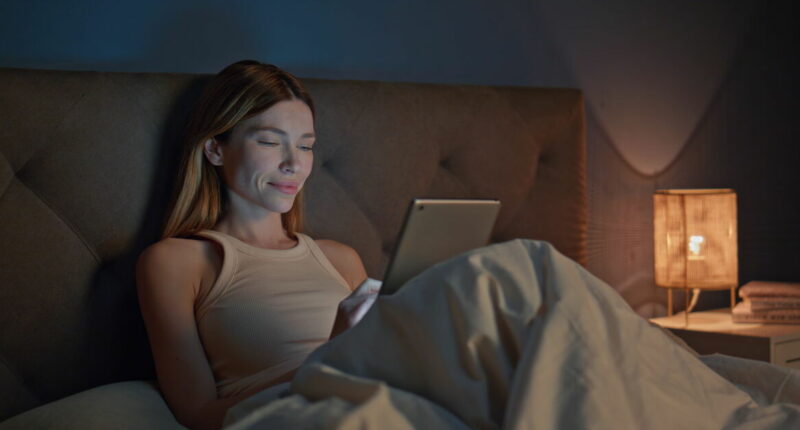Share this @internewscast.com
Your cosy bedtime reading session might be causing more damage than you realise.
Many of us find it relaxing to end the day with a few chapters of a good book, yet sleep experts have highlighted a concerning aspect of this seemingly harmless ritual.
The warning pertains particularly to those who use a tablet, like an iPad or Kindle, right before hitting the hay. This practice can disrupt the quality of sleep necessary for cognitive health, potentially increasing the risk of dementia in the long run.
Sleep experts at Bed Sava are now cautioning against the seemingly harmless bedtime activity.
What does the research say?
The illumination from these devices can meaningfully impact our internal clocks. A study conducted in a controlled sleep environment showed that individuals reading from a light-emitting tablet before bedtime experienced reduced melatonin production, a shift in their body clocks, longer time to fall asleep, decreased REM sleep, and felt less refreshed the next day.
These findings were objectively measured and verified, rather than self-reported. The duration of screen exposure is also crucial. Additional research indicated that around two hours of evening tablet use significantly diminished melatonin levels, with more intense brightness amplifying this effect.
This is the kind of late-night routine many households consider “normal.”
Why this could lead to earlier cognitive decline
Sleep isn’t merely “rest” – it’s essential nightly maintenance for learning and memory functions.
A thorough 30-year investigation involving 7,959 adults (Whitehall II study) demonstrated that regularly sleeping six hours or fewer between the ages of 50 and 70 was linked to an approximate 30% increase in dementia risk later in life, compared to those with typical sleep length.
Put simply, chronic short or disrupted sleep during middle age significantly shifts the odds against you.
This result aligns with broader research—a systematic review and meta-analysis of multiple studies also concluded that sleep disturbances heighten dementia risk over time.
Tablet-induced circadian disruption and fragmented REM represent precisely the patterns that concern sleep scientists most.
A Bed Sava spokesperson explains: “Reading is a brilliant wind-down – just remove the glow. Use a paper book under a low, warm lamp, or switch to audio with the screen off. Your bedroom should be cool, dark and quiet so your brain can run its overnight repairs.”
Healthy alternatives
- Exchange pixels for paper (or audio). Maintain the ritual, eliminate the glow. Audiobooks or radio function brilliantly – with the display switched off.
- Establish a screen curfew. If you must utilise a device, activate night mode, reduce brightness to minimum, hold it further from your eyes, and cease usage at least one hour before bedtime.
- Utilise warm, dim lighting. A small bedside lamp positioned behind your shoulder surpasses any backlit screen.
- Safeguard the darkness. Blackout curtains or an eye mask prevent stray light intrusion; store bright chargers and LEDs out of sight.
The crux of the matter is not the content you’re consuming, but rather the glowing screen you’re viewing it on.
The nightly exposure to the bright light of your tablet can disrupt your sleep patterns and has been associated with an increased risk of dementia in the future. Following expert advice and opting for paper over pixels will provide your brain with the rest it requires.











